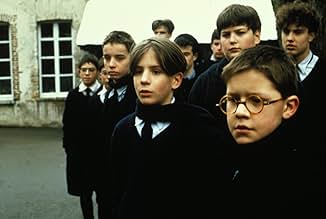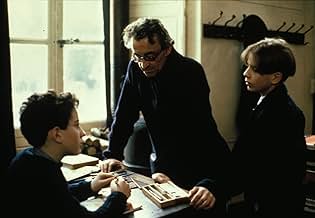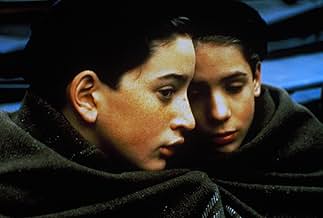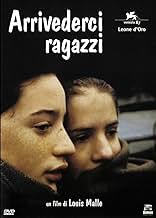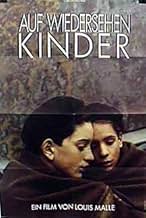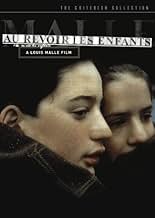IMDb RATING
8.0/10
38K
YOUR RATING
A French boarding school run by priests seems to be a haven from World War II until a new student arrives. Occupying the next bed in the dormitory to the top student in his class, the two yo... Read allA French boarding school run by priests seems to be a haven from World War II until a new student arrives. Occupying the next bed in the dormitory to the top student in his class, the two young boys begin to form a bond.A French boarding school run by priests seems to be a haven from World War II until a new student arrives. Occupying the next bed in the dormitory to the top student in his class, the two young boys begin to form a bond.
- Nominated for 2 Oscars
- 28 wins & 12 nominations total
Stanislas Carré de Malberg
- François Quentin
- (as Stanislas Carré De Malberg)
Luc Etienne
- Moreau
- (as Luc Étienne)
- Director
- Writer
- All cast & crew
- Production, box office & more at IMDbPro
Featured reviews
This is a very moving film, most likely based on an actual event. The Carmelite priest,Lucien Bunel (1900-1945, "Pere Jacques") was founder and director of the Petit College d'Avon, near Fontainebleau. He was arrested on Jan. 15, 1994, accused of hiding 3 Jewish boys among his students, and was deported to the infamous Mauthausen concentration camp. He died in Linz, Austria on June 2, 1945. Malle's film depicts the intense trauma of Jewish children who were separated from their families and forced to take on a new identity in hiding, always afraid of being found out. They also faced the dilemma of how to maintain their Jewishness in the setting of a Catholic school. So, not just another war movie, this film depicts some of the real struggles facing hidden children, many of whom were saved by courageous Christians in Europe.
In this spellbinding film, Louis Malle is able to evoke the fear and sadness some children suffer while away from home at a boarding school, the loneliness. Yet he doesn't dwell on sentimentality but only skims it, instead peppering the scenes with the bravura and faux assertiveness of adolescents. Malle and the actors adroitly juggle circumstances and emotions. Ultimately, they capture a terrifying time in history through the eyes and uncertainty of boys who aren't as grown-up as they'd like to think.
The two main characters, Julien Quentin and Jean Bonnet, are beautifully portrayed by two very capable and talented young actors. The supporting cast is equally impressive. The film is directed with a touch of genius, and holds its own when compared to another motion picture masterpiece, To Kill a Mockingbird.
The two main characters, Julien Quentin and Jean Bonnet, are beautifully portrayed by two very capable and talented young actors. The supporting cast is equally impressive. The film is directed with a touch of genius, and holds its own when compared to another motion picture masterpiece, To Kill a Mockingbird.
"More than 40 years have passed, but I'll remember every second of that January morning until the day I die."
Part of what makes this autobiographical film from Louis Malle so powerful is that a big portion of its coming of age material is universal. In a Catholic boarding school we see hazing and random bullying while ineffectual headmasters look the other way, bedwetting, reading after hours, playground battles, curiosity about girls, and the kind of childhood events that get remembered for life, like getting lost in the woods. In other words, it's just boys trying to get through the difficulties of growing up, and really could be any group of boys, at any time.
But of course this isn't just any period, it's occupied France during WWII, and while the school full of affluent kids seems mostly insulated from that, danger lurks. Three new boys who have been admitted and given new names are secretly Jews, a fact which gradually becomes known by Julien, one of the smarter students (Gaspard Manesse, playing the young Malle). He has a rivalry and a friendship with one of the new boys (played soulfully by Raphaël Fejtö), and the nuances of their relationship not only felt authentic, but it made it hard to know how the film would play out.
I love the dimensions of the film, including the differing Catholic responses to the Jewish issue in Vichy France - some good, some bad. There is also an axis of rich/poor, and I loved the sermon where the priest shocks the visiting parents by criticizing the behavior of the wealthy. Lastly, the use of the Chaplin film 'The Immigrant' (1917) within the film is pitch perfect, and a masterful touch.
Part of what makes this autobiographical film from Louis Malle so powerful is that a big portion of its coming of age material is universal. In a Catholic boarding school we see hazing and random bullying while ineffectual headmasters look the other way, bedwetting, reading after hours, playground battles, curiosity about girls, and the kind of childhood events that get remembered for life, like getting lost in the woods. In other words, it's just boys trying to get through the difficulties of growing up, and really could be any group of boys, at any time.
But of course this isn't just any period, it's occupied France during WWII, and while the school full of affluent kids seems mostly insulated from that, danger lurks. Three new boys who have been admitted and given new names are secretly Jews, a fact which gradually becomes known by Julien, one of the smarter students (Gaspard Manesse, playing the young Malle). He has a rivalry and a friendship with one of the new boys (played soulfully by Raphaël Fejtö), and the nuances of their relationship not only felt authentic, but it made it hard to know how the film would play out.
I love the dimensions of the film, including the differing Catholic responses to the Jewish issue in Vichy France - some good, some bad. There is also an axis of rich/poor, and I loved the sermon where the priest shocks the visiting parents by criticizing the behavior of the wealthy. Lastly, the use of the Chaplin film 'The Immigrant' (1917) within the film is pitch perfect, and a masterful touch.
Au Revoir Les Enfants (1987)
A wrenching, sensitive, all-too-true drama set in a gorgeous French wooded outpost during World War II. The main actors are boys, and they play their parts with unusual conviction, unexaggerated but with intensity. And the anti-Semitism that arises, though inevitable in Nazi territory, comes subtly and really stings. The movie isn't complete without this horror, but the horror is made complete by the really vivid recreation of this kind of private boys school--a period movie at its best.
Director Louis Malle has not only a message, but a sensitive feel for the medium--for making fluid the flow and background of the plots of his films. It's also a fairly complex mix of types, and you can somehow keep them all straight as it goes--as straight as you are meant to as the facts unfold. In the end, it confirms a familiar story of Nazi terror, but one that can't be told too often.
A wrenching, sensitive, all-too-true drama set in a gorgeous French wooded outpost during World War II. The main actors are boys, and they play their parts with unusual conviction, unexaggerated but with intensity. And the anti-Semitism that arises, though inevitable in Nazi territory, comes subtly and really stings. The movie isn't complete without this horror, but the horror is made complete by the really vivid recreation of this kind of private boys school--a period movie at its best.
Director Louis Malle has not only a message, but a sensitive feel for the medium--for making fluid the flow and background of the plots of his films. It's also a fairly complex mix of types, and you can somehow keep them all straight as it goes--as straight as you are meant to as the facts unfold. In the end, it confirms a familiar story of Nazi terror, but one that can't be told too often.
An elegantly crafted tale of friendship, compassion & boyhood, Au Revoir Les Enfants is a heartbreaking, poignant & tragic cinema that's actually based on the events which took place during the childhood of this film's director and is an endearing portrait of life at school, student rivalry & beauty of friendship.
Set in France during the final years of the Second World War, the events of Au Revoir Les Enfants takes place in a Catholic boarding school and is narrated through the eyes of Julien Quentin; one of the students at the school. The plot covers his relationship with a newly arrived enigmatic student with whom he's at odds at first but the two learn to get along & share a big secret.
Directed by Louis Malle, the film is nicely crafted with many details beautifully captured by its calmly moving camera. The screenplay tries to get an authentic vibe of education in Catholic schools, the conversations between its characters carry the childlike innocence & the performances by its cast, especially the child actors, becomes more captivating as the story progresses.
On an overall scale, Au Revoir Les Enfants (also known as Goodbye Children) isn't in anyway a hard-hitting or emotionally scarring cinema but the gentle manner in which it depicts its premise really makes you care for its characters, makes you wish they get away, makes you wish for a miracle & although its subject matter has been dealt in a better manner, the film is worthy of a watch for its two main characters alone.
Set in France during the final years of the Second World War, the events of Au Revoir Les Enfants takes place in a Catholic boarding school and is narrated through the eyes of Julien Quentin; one of the students at the school. The plot covers his relationship with a newly arrived enigmatic student with whom he's at odds at first but the two learn to get along & share a big secret.
Directed by Louis Malle, the film is nicely crafted with many details beautifully captured by its calmly moving camera. The screenplay tries to get an authentic vibe of education in Catholic schools, the conversations between its characters carry the childlike innocence & the performances by its cast, especially the child actors, becomes more captivating as the story progresses.
On an overall scale, Au Revoir Les Enfants (also known as Goodbye Children) isn't in anyway a hard-hitting or emotionally scarring cinema but the gentle manner in which it depicts its premise really makes you care for its characters, makes you wish they get away, makes you wish for a miracle & although its subject matter has been dealt in a better manner, the film is worthy of a watch for its two main characters alone.
Did you know
- TriviaBased on an incident from Louis Malle's own youth. Julien is modeled after Malle.
- GoofsWhen hiking, Julien asks what day it is and is told that it's Thursday, January 17th, 1944. That date was actually a Monday.
- Crazy creditsPour Cuotemoc, Justine et Chloé. (opening credits)
- How long is Au Revoir les Enfants?Powered by Alexa
Details
- Release date
- Countries of origin
- Official site
- Languages
- Also known as
- Goodbye, Children
- Filming locations
- Production companies
- See more company credits at IMDbPro
Box office
- Gross US & Canada
- $4,542,825
- Gross worldwide
- $4,575,613
- Runtime
- 1h 44m(104 min)
- Color
- Sound mix
- Aspect ratio
- 1.66 : 1
Contribute to this page
Suggest an edit or add missing content

![Watch Bande-annonce [VOST]](https://m.media-amazon.com/images/M/MV5BZDlkMTI5OTgtNmU4My00MzRjLWFkNzMtYmMyMDlhNjQ2OTFmXkEyXkFqcGdeQXRyYW5zY29kZS13b3JrZmxvdw@@._V1_QL75_UX500_CR0)
